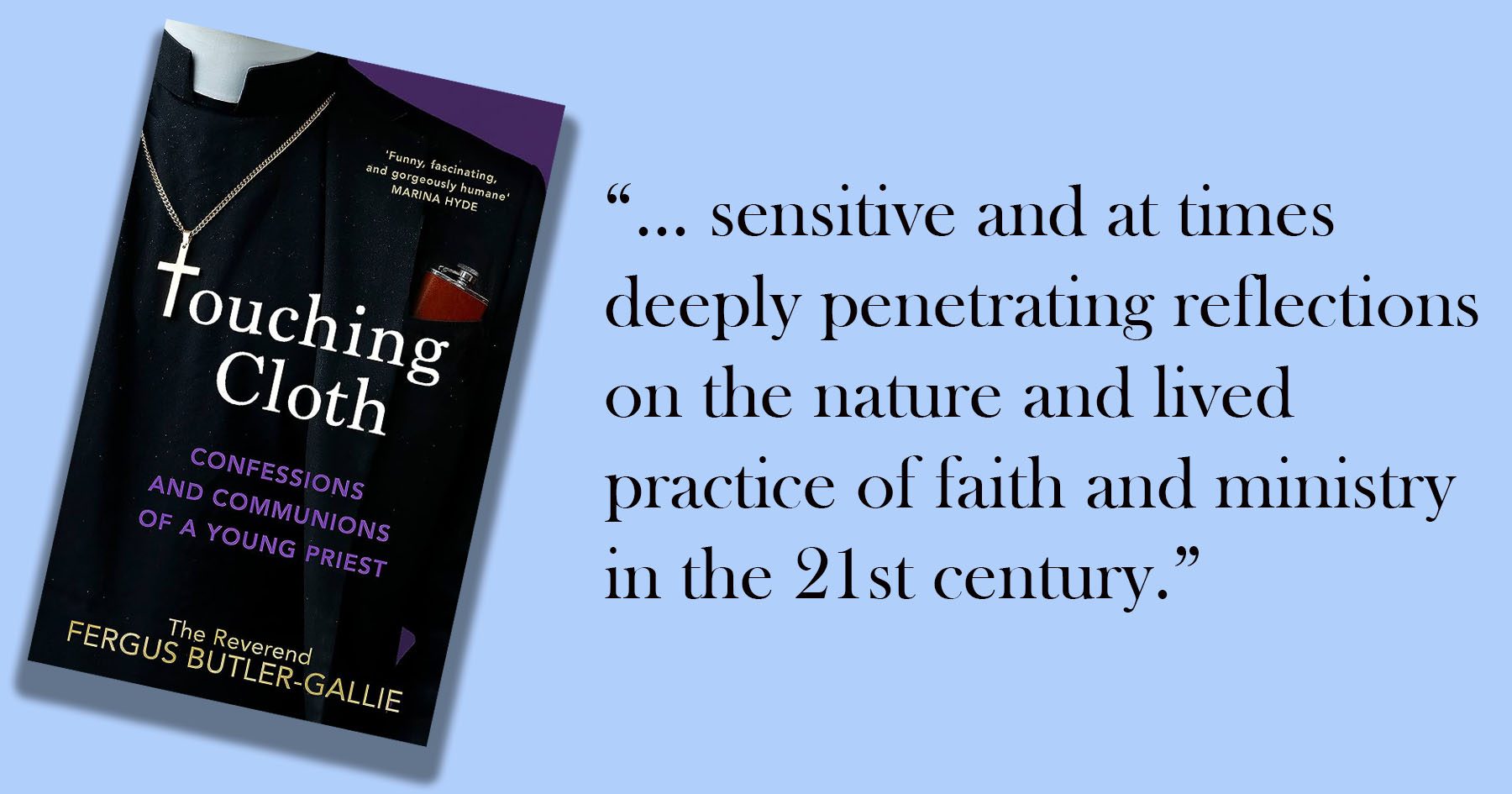Perhaps you have found yourself wondering, what is the correct response for an Anglican cleric in street clothes when he or she is offered ketamine at a house party? If you are the Reverend Fergus Butler-Gallie, the answer comes easily: “It’s all right, thanks. I’m C of E.” Butler-Gallie shares this useful and virtually unanswerable response — applicable in almost any pastoral situation — in his latest book, Touching Cloth: Confessions and Communions of a Young Priest, published earlier this year by Penguin.
Touching Cloth is the latest ecclesiastically-oriented offering by Butler-Gallie, an author, columnist, social media wit and raconteur of the first order. He also happens to be a priest of the Church of England — and a decidedly young one at that — and Touching Cloth is an account of his first year in priestly ministry. As a sacerdotal wit, Butler-Gallie is a doubly rare bird. On the one hand, he stands in the noble tradition of Anglican clerical humourists from Jonathan Swift to E.L. Mascall that now has sadly few representatives on either side of the Atlantic. On the other, he is a self-described “young millennial” priest, who has taken it upon himself to interpret the good news of Jesus Christ in an increasingly indifferent — not to say hostile — context. How shall today’s Christian, and especially today’s Christian priest, shine the light of Christ “in the darkness of a world that often doesn’t care, doesn’t notice or doesn’t believe?” It is this thorny question that Touching Cloth sets out to explore.
I first encountered Butler-Gallie as the author of the hilarious A Field Guide to the English Clergy, a collection of side-splitting vignettes profiling some of the great eccentrics and renegades of English clerical history. These include such oddballs as the Reverend Frederick Densham, who barred the doors of his church and fortified his rectory with barbed wire against the importunate intrusions of his parishioners, and His Grace, the Most Reverend and Right Honourable Lancelot Blackburne, Lord Archbishop of York, who dabbled in piracy as a young deacon and entertained the prime minister of the day in the company of his wife, his mistress and his illegitimate son whom he had made his chaplain.

I guffawed my way through the Field Guide (much to my wife’s chagrin) one Christmas holiday, and so when I learned that Touching Cloth was to be published in May this year, I pre-ordered a copy at once. The book more than repaid my eagerness. Butler-Gallie describes his first year in priest’s orders, plying his trade as a humble curate amid the urban bustle of central Liverpool. Each chapter centres on an amusing anecdote relating to the theme of a given moment in the liturgical year, like the story of the accidental enema on Remembrance Sunday (chapter 5) or that of the excessively merry Christmas caroller who brought up his, er, Christmas cheer all over himself during a rousing rendition of “We Wish You a Merry Christmas” (chapter 7). But the book is more than a collection of funny anecdotes. In Butler-Gallie’s hands, they become the starting points for sensitive and at times deeply penetrating reflections on the nature and lived practice of faith and ministry in the 21st century. Butler-Gallie’s anecdotes, then, are more than comedic set-pieces; they are, like all good stories, icons of profounder realities that can only be expressed through narrative.
Touching Cloth, like the Field Guide before it, is riotously funny, but where others use humour to conceal, Butler-Gallie deploys it the service of a disarming candour. He is remarkably transparent about his own sins and failures, about the fact that he likely eats and drinks more than is good for him, about his insecurities surrounding his weight, his appearances and his fitness for ministry. We are, the reader cannot but conclude, getting a picture of the whole man beneath the dog-collar (I will leave you to do with that image what you will), just as we are of the often hilarious reality of ministry in a busy urban setting. Nor is Butler-Gallie shy about his preferences: he has, for instance, a penchant for the traditional liturgy of the Book of Common Prayer, saying of Common Worship (the Church of England’s equivalent of the Canadian Book of Alternative Services) that he would “rather praise God using a dishwasher manual.” At no point could the reader accuse Butler-Gallie of mincing words.
The book succeeds on a number of levels and for a variety of readerships. For the non-Christian, catching a glimpse, perhaps for the first time, of the foreign land of professional faithfulness, Butler-Gallie presents the fallible human face of the priesthood. Not holier-than-thou (nor even, by his own admission, particularly holy at all), Butler-Gallie gaily and deftly dispels the caricature of the dour, otherworldly, moralising cleric of secular nightmare. In its place, he paints a compelling and sensitive portrait of the priest as an ordinary person—prone to the same vices, susceptible to the same insecurities, cherishing the same down-to-earth hopes as the rest of us — called by God through no merit of his or her own to an extraordinary (and extraordinarily weighty) vocation. Butler-Gallie obviously wrote with a non-believing audience in mind. Frequent footnotes define some of the more distinctively ecclesiastical terms; in our secular age, an author cannot count on his readers knowing the difference between, say, a stole and a sacristan.
For the lay Christian, too, there is much in Touching Cloth to surprise as well as to entertain. Butler-Gallie lifts Oz’s curtain to give those of us on the nave side of the altar rail a privileged look both at the priest’s interior life and the zany disorder that often characterizes priestly ministry. Seldom is the layperson aware, on arriving in his or her pew on a Sunday morning, that just moments before, in that very pew, the curate and a bevy of lay assistants has scraped up a faecal protest left by a disgruntled parishioner (see chapter 5 for that pungent tale). More seldom still is he or she cognizant of the loneliness, the anxiety and the overwork that weigh upon the soul of the bright bechasubled figure at the altar. Butler-Gallie shines a light upon both the humorous and the sombre aspects of priestly ministry that most laypeople would not have occasion ever to consider.
Not unusually for a first printing, the book is guilty of the occasional malapropism. We read, for instance, of “sallied ranks” (one wonders just what Sally did to them!) assembled for a Remembrance Sunday service, when surely the author means ‘serried.’ But small errors like these by no means detract from the charm of the book as a whole, and indeed they go rather a long way to confirming one of its central theses, namely that priests, even when infused with the grace of ordination and backed up by the formidable editorial battalions of Penguin Random House, are prone to error just as much as the rest of us.
You have probably guessed by now that I find Butler-Gallie to be a very sympathetic figure: I am, like him, a late millennial[1] who was not raised in a Christian home; like him, I came to faith in young adulthood; and, like him, I have at times struggled to discern how I fit within a denomination that is more and more by and for the old. I felt a special pang of fellow-feeling when I read in the epilogue that Butler-Gallie, after enduring “abusive and manipulative” treatment at the hands of older clerics, had been informed that he did not have “enough ‘experience’ to justify another post” in his diocese and that, as such, he was leaving priestly ministry.
The phrase “lack of experience” is, as I and some of my younger Anglican friends have come to discover, a handily euphemistic and all-too-common charge to level at young, eager Christians discerning how best to use their gifts to God’s glory and the church’s good. I say that the phrase is a handy euphemism because a “lack of experience” can be invoked to cast a fog of bamboozling imprecision over other more specific objections to a young person’s ministry. Perhaps they favour the wrong liturgy or subscribe to outmoded theological views, or perhaps they simply don’t act, talk or look as the late 20th century thought a cleric should. All these disabling qualities can be packaged together and tied with the neat bow of a “lack of experience;” and doubtless, so it is supposed, the rough places of objectionable youthful manners and views will be made plain by the passing years. If there is a lesson to be gleaned from Butler-Gallie’s — and how many others’! — experience of rejection, it is perhaps this: that young Christians take the church at its word when it claims to value their distinctive perspectives and contributions and, as such, that the church must to everything in its power to vindicate this belief, lest the trust of the 20-something sour into the 30-year-old’s calloused cynicism.
But I don’t want to end this review on a dark note. I learned from social media, the worthy successors to the Roman goddess Rumour, that Butler-Gallie has recently secured a living in some idyllic rural parish, which no doubt will furnish yet more comedic fodder for his skilled and omnivorous pen. I pray God that he may be granted a long and happy ministry — and plenty of leisure to write.
[1] Millennials form the generational cohort of those born from about 1981 to 1996.



